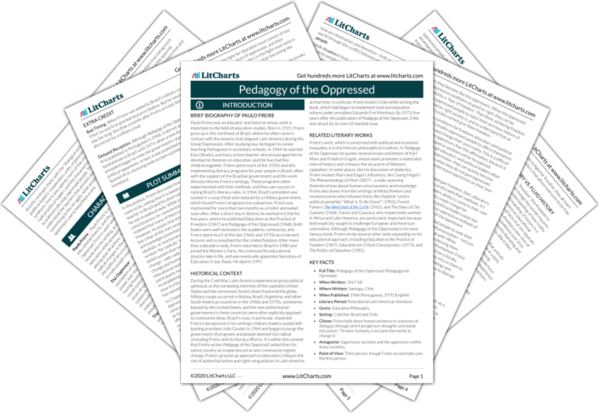


Pedagogy has achieved more global fame than any other book translated from Portuguese. More than a million copies have been sold worldwide since the 1970 English translation. For a book infused with Hegel from cover to cover, and peppered with footnotes invoking Frantz Fanon, Erich Fromm, Karl Marx, and Chairman Mao, it has been surprisingly popular and enduring. The book that made these insights famous, Pedagogy of the Oppressed, was published in Portuguese in 1968, and in English in 1970, fifty years ago. “The teacher cannot just dictate from on high.” He had not understood that he and his students were co-creators of knowledge in dialogue, they would learn from one another. In that moment, Freire realized that although his intentions in giving his Piaget lecture had been progressive, his pedagogy was not: he had treated his students as empty vessels-or as he would later write, vaults in a bank-waiting to be filled, not as interlocutors or partners in the learning process. As Raff Carmen, a scholar and practitioner of adult education, would write decades later in an obituary of Freire, the confrontation “stood out as the cathartic moment shaping Freire’s thinking about progressive education: even when one must speak to people, one must convert the ‘to’ into a ‘with’ the people.” The moment captured something vital about knowledge: it comes from lived experience -the teacher cannot just dictate from on high. The teacher was the Brazilian educator and thinker Paulo Freire. The worker described his own living conditions: his kids were “dirty, crying, making a noise… And people have to get up at four in the morning the next day and start all over again… If people hit their kids, sir, it’s because life is so hard they don’t have much choice.” Well spoken… do you know where people live, sir? Have you been in our houses, sir?” “We have just heard some nice words,” the man said, politely but pointedly addressing the teacher as “Doctor.” Then a worker raised his hand to ask some questions. He was pleased with his lecture as he delivered it-a pretty lucid and engaging explication, if he did say so himself. Hired by the Brazilian government to set up a workers’ literacy program, he waxed progressive to an audience of fisherman, peasants, and urban workers on why, according to the Swiss psychologist Jean Piaget, they should not beat their children.

“Freire viewed the purpose of education as the liberation of the oppressed.” Even as many more people around the world have access to education, schooling everywhere remains intertwined with systems of oppression, including racism and capitalism.


 0 kommentar(er)
0 kommentar(er)
